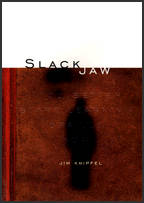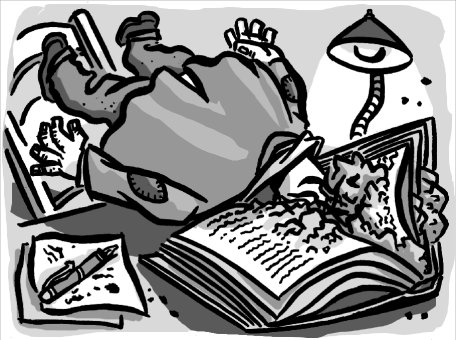|
Back to Illustration by Russell Christian. See more Slackjaw columns in Patreon Copyright Jim Knipfel. All rights reserved. Purchase Jim Knipfel's books:
Back to
|
Slackjaw by Jim Knipfel Shamed Into ItWe all did it. Those of us who write down stories did, anyway. We started writing in the first place because we'd read things. Things that we liked and didn't like, things by people whose skill we admired, or by people we knew we could outdo. And when we first sat down to write things of our own, we tried really really hard to write like those writers we most admired. Any writer who denies that he or she did this is more likely than not a liar--and a big fat one too. In his first novel, The Town and the City, Jack Kerouac was trying to be Thomas Wolfe. I think that was as obvious back then as it is now. The notes Henry Miller jotted down for Tropic of Cancer reveal that he had a laundry list of writers he wanted to emulate in order to express certain moods, emotions, or ideas. While I'm far from being in league with those two (they were simply the first examples that came to mind), I was certainly guilty of the same thing when I first started writing things down some 17 years ago. Except in my case I wasn't trying to be Thomas Wolfe.
Being young, impressionable and new to the game, I of course tried to write like the people I was reading at the time. And being a young, cynical, angry, middle-class suburban punk kid with half an education, I was reading exactly the same things every other kid of that description was reading at the time, more or less: the Beats, Henry Miller, Hunter Thompson, Norman Mailer, Charles Bukowski, Lester Bangs, Celine, Nick Tosches, Jim Thompson, Beckett, maybe a little Kafka. Although they always seem radical and dangerous the first time you pick them up, it took me awhile to realize just how commonplace they all were. I don't think things have changed much today. If you match the above personality profile, then it's a good bet these authors represent the core of your personal library. So anyway, when I got started, those were the writers I wanted to be, and so they were the ones I copied. But 17 years ago, as now, I was writing for a weekly newspaper. The thing about writing for the weeklies is that you need to churn things out very quickly, turn them in, and then, before you can blink too many times, there they are in print and on the street. There's not much opportunity for revisions and rewriting, for the kind of careful fine-tuning and editing that will often reveal (and with luck eliminate) some of the more glaring, humiliating flaws in a story. I was reading all of the above authors one right after the other, boom-boom-boom. A Burroughs, then a Miller, then some Mailer essays, then some Beckett, then the new Thompson book. And again, being impressionable, whatever I happened to be reading would both consciously and unconsciously affect what I was writing. So one week it'd be a Miller-esque column, the next would have shades of Mailer, the one after that would undeniably be my stab at Hunter Thompson, with maybe a second one the following week. I stayed away from Celine, though, wisely figuring that any attempt to ape him!…would be too transparent!…Fuck! I wasn't plagiarizing anything outright--not dropping in paraphraphs from Naked and the Dead or anything--just trying to project, if clumsily, a sense of their tone and style and choice of words. All this I thought was fine. I wasn't "looking for my voice." I thought I had my voice already--which just happened to approximate Henry Miller's and Bukowski's and whoever else's, depending on the week. I simply didn't think anyone read books anymore, so I didn't think anyone would notice. I was an idiot, of course. I wouldn't learn until later that it was what everybody did. A few letters to the paper mentioned it, but only vaguely and only in passing, so I ignored them. This was all back in Philly in the late '80s. One evening, after the column had been around for awhile, I met a friend of mine at a tavern, and he introduced me to a couple of his other friends. They were writers too and put out a small literary 'zine. They were also pretty well connected with the lower end of Philly's art world. We knew a lot of people in common, and I'd certainly heard their names around. After talking to them for awhile, I remember thinking that I thought they were kind of snide and seemed a little too sure of themselves. I wasn't having a very good time. After a third or fourth beer, one of these guys--Dave was his name, I think, though I can't be sure about that anymore, cornered me. "I've been reading you for awhile," he said. "And you know what? I can tell you exactly what you were reading every single week." He stared at me in triumph. He was a little drunk too. "I can tell what you were reading this week. I can tell what you were reading last week. I can tell exactly what it was you were reading on any given week." "Oh," I said. Then he proved it. "When you wrote this week's column, you were reading Advertisements for Myself," he began. "Last week, it was The 14th Ward from Black Spring. Before that…" He ticked off a month's worth and got them all right on the nose--even the things I thought were really obscure. It was quite embarrassing. It wasn't like the stories I was telling were untrue--they weren't. Still, though, it felt like I'd been exposed as a fraud somehow. There was something in the way I was telling those stories that was untrue. I didn't argue with Dave that night. I didn't call him a liar nor pretend that he was way off the mark. I didn't even run out of the bar wailing with my hands over my face. I was cordial and made no scene. I complimented him on how well-read he was, tried to laugh it off. Then I drank heavily for the rest of the night and did what I could to avoid him. But if he could tell, who else could? Over the next days and weeks, I stopped reading. I tried to approach each new column with as clear a head as I could muster. The thousands of books I had read were all still in my head, obviously, there was no escaping that, but I figured it might be best not to come to the computer with one particular work or another right there at the tippy-top of my brain. No need to make it that obvious. It was interesting to see what my stories sounded like when I wasn't standing on someone else's shoulders as I wrote them. They weren't as classy, maybe, or as rhythmically complex, they didn't have the rich vocabulary or an immediately recognizable style all their own, but there they were. They were a little sloppy and clunky, but in time, another couple years it took, they were mine, sort of. Mostly, anyway. All it took was a little shame. |




